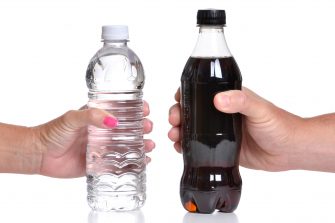Can Carbonated Drinks Make You Feel Hungrier?
 With the significant increase in obesity rates, numerous studies have been done to determine which dietary habits do or do not contribute to this health problem. Multiple studies have noted a connection between soft drink consumption and obesity. Researchers decided to look at the effects of carbonated gas, a primary component of soft drinks, to see if it could be the source of this connection.
With the significant increase in obesity rates, numerous studies have been done to determine which dietary habits do or do not contribute to this health problem. Multiple studies have noted a connection between soft drink consumption and obesity. Researchers decided to look at the effects of carbonated gas, a primary component of soft drinks, to see if it could be the source of this connection.
While the study primarily focused on rats, they also tested 20 male human subjects after ingesting various beverages. Results showed that the rats who consumed gaseous beverages over the course of a year gained more weight and had higher rates of the hunger hormone ghrelin than those who consumed degassed carbonated beverages or water. They also had an increase in liver lipid accumulation compared to the control rats. In the parallel study, the human subjects experienced higher rates of the hormone ghrelin after consuming carbonated beverages.
While the sugar in soft drinks has long been touted as the cause of weight gain, soft drinks may actually deliver not one, but 2 obesity risk factors: sugar AND gassed carbonation. This initial study to evaluate the carbonation connection strongly suggests that carbon dioxide gas increases the release of ghrelin. This, in turn, may lead to eating larger portions and thereby increase the risk of obesity. Thus, it may be advisable to limit or eliminate carbonated beverages, even the low sugar versions, when trying to lose weight.
SOURCE: Carbon dioxide in carbonated beverages induces ghrelin release and increased food consumption in male rats: Implications on the onset of obesity – Dureen Samandar Eweisx, Fida Abed, Johnny Stiban – Department of Biology and Biochemistry, Birzeit University, P.O. Box 14, Ramallah, West Bank 627, Palestine – DOI: http://dx.doi.org/10.1016/j.orcp.2017.02.001